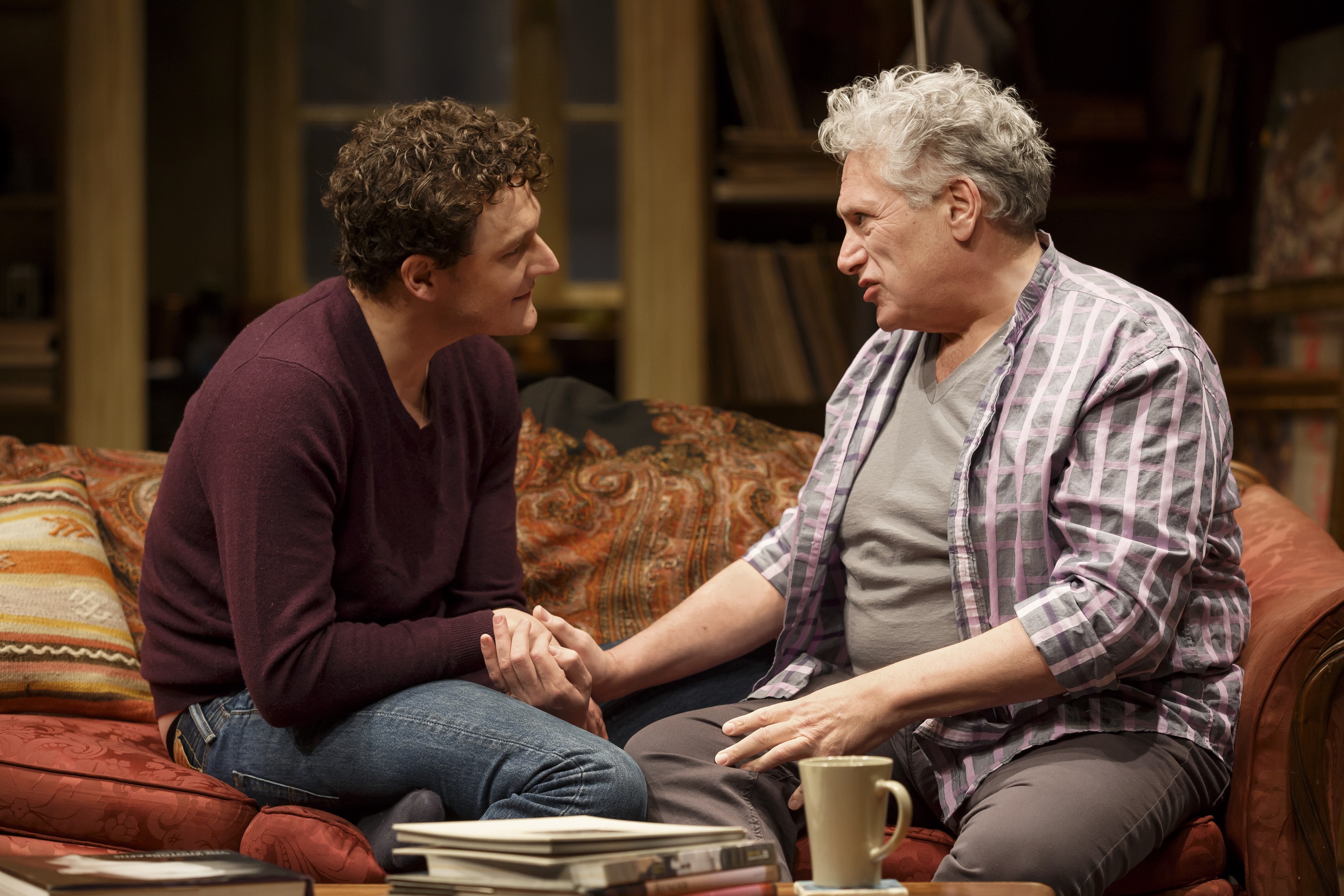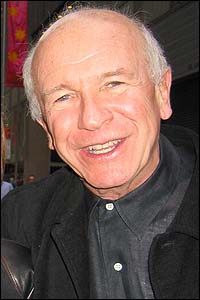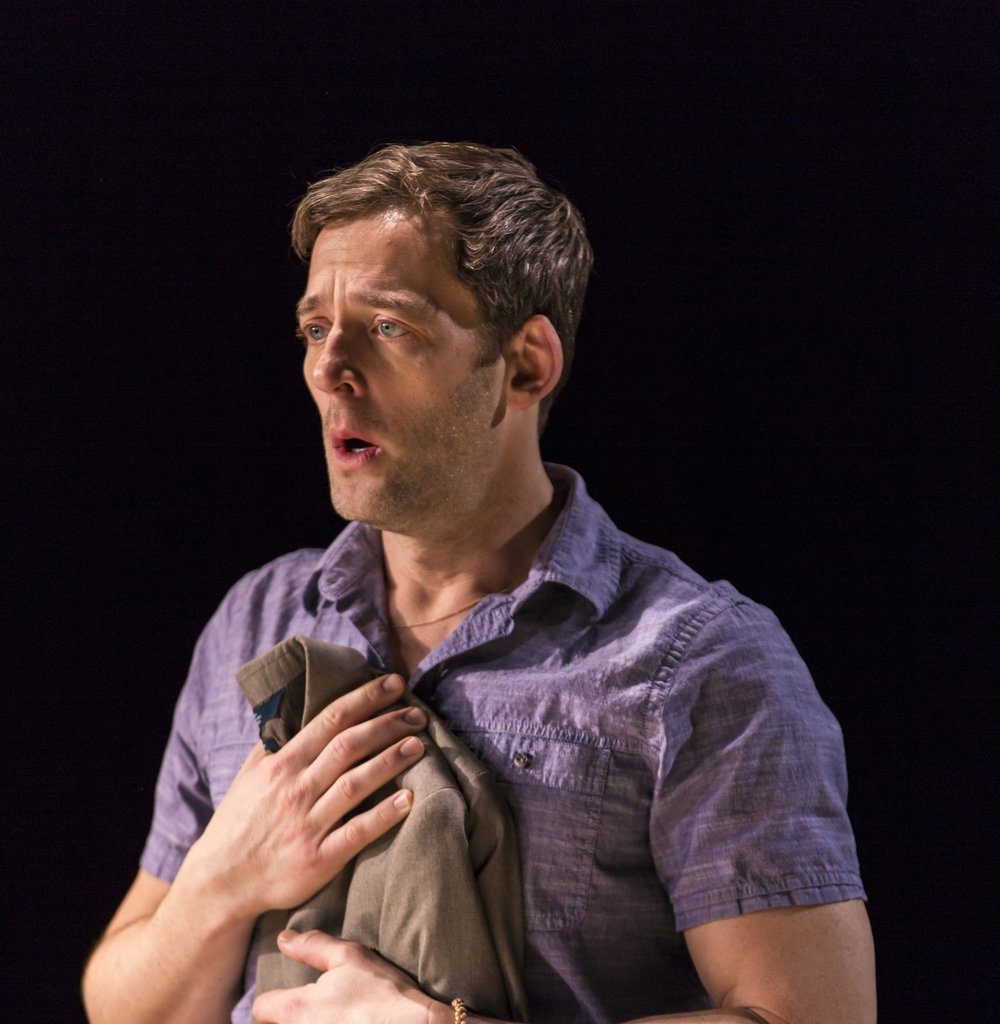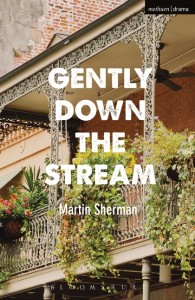 Gently Down the Stream
Gently Down the Stream
A play by Martin Sherman
Produced by The Public Theater, New York City
GENTLY DOWN THE STREAM might be called, to borrow from Tennessee Williams, a “memory play” whose main character, Beau—played by that Tony-winning force of nature, Harvey Fierstein—has several long monologs recounting his life as a gay man who has loved and lost more than once. Equally important, Beau is a repository of gay history from the 20th century and the opening decade of the 21st. In recounting his past, he is also conjuring the history of gay life. Its brief, gemlike flame flashed during World War II when, amid global catastrophe, new possibilities seemed to emerge; but decades of repression followed, and then the specter of AIDS came to loom large and to extinguish individual lives along with recent gains by a burgeoning sexual minority. These musings, addressed to the audience, are in fact prompted by a much younger man, Rufus, an English lawyer who has maneuvered his way into Beau’s life after a one-night stand. The play begins on the morning after.
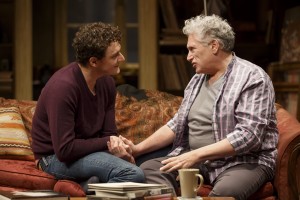
We are in London; it is 2001; and the handsome, randy Rufus is thoroughly smitten with this aging American expatriate musician who accompanied cabaret singer Mabel Mercer on the piano, saw the cosmopolitan world close-up, and now is settled into a cozy book-lined apartment whose initial appearance prompts the audience to applaud. (Kudos to scenic designer Derek McLane.) Rufus, played by Gabriel Ebert, immediately declares his long-term interest in the geriatric Beau, who is rightfully skeptical of this younger man’s fascination with him, which strikes the world-weary Beau as a kind of fetishism that is bound to wane. Instead, Rufus begins recording Beau’s reveries about the past, which brought him from his hometown of New Orleans to Paris and London. Despite Beau’s misgivings, Rufus is soon sharing his quarters, and an increasingly deep bond begins to form.
Rufus’ manic nature—his fascination with every nugget of gay lore, his frisky and passionate delight in intergenerational sex, his archival commitment to recording Beau’s detailed reminiscences about times that Rufus can only have heard or read about—is soon undercut by its opposite, a deep and resounding gloom. Nevertheless, Rufus is by now tethered to Beau. Years pass, and Rufus proposes marriage as their next logical step. Beau’s skepticism practically turns to horror at such a prospect. Life has burned the optimism out of him, and, while Rufus has asked for Beau’s hand in earnest, the latter cannot find a way to accept. Their relationship, always an “open” one, seems to Beau more than he might have hoped for; he is not going to rock this boat.
Martin Sherman has written an intimate play that probably has its share of autobiographical elements. The author of Bent, the controversial 1979 play about the Nazis’ roundup and incarceration of homosexuals in the 1930s and ’40s, has been an American expatriate in London since 1980. Gently Down the Stream has the feel of a memoir mixed with social history as Sherman, now in his late seventies, offers his take on the clash of temperaments of two men separated by several decades and dissimilar expectations wrought by their very different experiences as gay men (repression for Beau, assimilation for Rufus). Over the course of scenes that advance the action to 2014, the breaks in time are signaled by recordings of Mabel Mercer’s laments on lost love. Meanwhile, each new scene gives Fierstein a chance to mourn his many personal losses against the backdrop of the LGBT community’s fitful advances.
Eventually, Rufus falls in love with a performance artist of louche demeanor who’s closer to his own age. With Beau’s eventual blessing, Rufus and Harry (Christopher Sears) wed, incorporating Beau into their coupled family as a kind of wise gay elder, one who may be called upon later for child care. Oh, yes, Sherman couldn’t resist the modern exigency of including a child who has two daddies.
In keeping with its name, Gently Down the Stream proceeds at a leisurely pace, but Gabriel Ebert’s hyperactive Rufus keeps the emotional narrative percolating. In the latter third of the play, the arrival of Harry as an unguarded, naïve artist seems to bring us right up to the present. But it is in Beau that the play finds its emotional heart and moral center. Fierstein’s iconic croak of a voice would not seem the most elastic instrument, yet he hits a range of emotional notes expressing joy, sorrow, anger, rage, disappointment, and despair. He can carp and shout and make himself heard even in the hoarsest stage whisper. And by the end, his Beau is prepared to find some solace, even happiness, in the role of a beloved gay elder. Fierstein, whose 1981 Torch Song Trilogy is a legendary marker of gay theater, makes this role his own and deepens a small, intimate play of many comic aperçus and painfully tender reflections.
Allen Ellenzweig, a New York City-based writer, is a frequent contributor to The G&LR.


